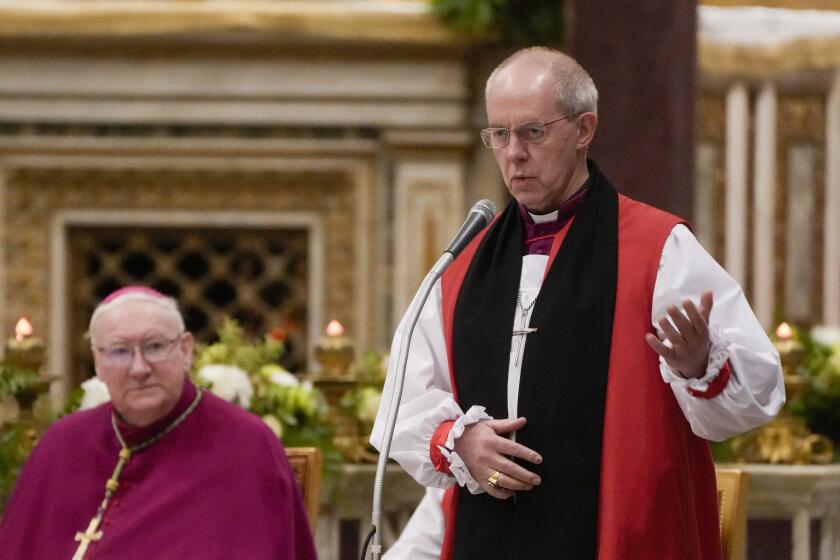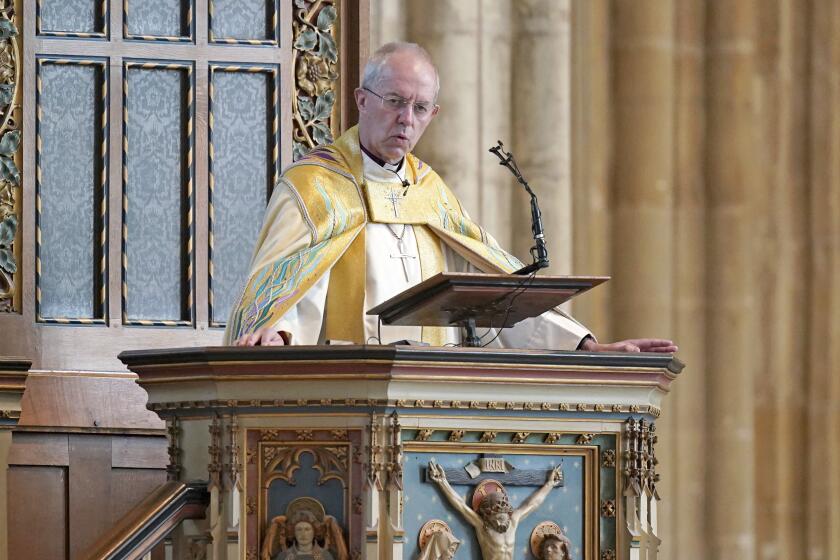Church of England head Justin Welby resigns over handling of sex abuse scandal

- Share via
LONDON — Archbishop of Canterbury Justin Welby, head of the Church of England and spiritual leader of the global Anglican Communion, resigned Tuesday after an investigation found that he failed to tell police about serial physical and sexual abuse by a volunteer at Christian summer camps as soon as he became aware of it.
Pressure on Welby had been building since Thursday, when release of the inquiry’s findings kindled anger about a lack of accountability at the highest reaches of the church.
“It is very clear that I must take personal and institutional responsibility for the long and retraumatizing period between 2013 and 2024,” Welby said in a statement announcing his resignation. “I believe that stepping aside is in the best interests of the Church of England, which I dearly love and which I have been honored to serve.”
Helen-Ann Hartley, the bishop of Newcastle, said Monday that Welby’s position was “untenable” after some members of the church’s national assembly started a petition calling on him to step down because he had “lost the confidence of his clergy.”
The Church of England should create a fund of more than $1 billion to address its historical links to the slave trade, advisory panel says.
But the strongest outcry had come from the victims of the late John Smyth, a prominent attorney who abused teenage boys and young men at Christian summer camps in Britain, Zimbabwe and South Africa over five decades. Andrew Morse, who was repeatedly beaten by Smyth over a period of five years, said that resigning was a chance for Welby to start repairing the damage caused by the church’s handling of historical abuse cases more broadly.
“I believe that now is an opportunity for him to resign,’’ Morse told the BBC before Welby stepped down. “I say opportunity in the sense that this would be an opportunity for him to stand with the victims of the Smyth abuse and all victims that have not been treated properly by the Church of England in their own abuse cases.”
Welby’s resignation comes against the backdrop of widespread historical sexual abuse in the Church of England. A 2022 report by the Independent Inquiry Into Child Sexual Abuse found that deference to the authority of priests, taboos surrounding the discussion of sexuality and a culture that gave more support to alleged perpetrators than their victims helped make the Church of England “a place where abusers could hide.”
Welby’s supporters had argued that he had been instrumental in changing the culture of the church since he became archbishop of Canterbury in 2013.
The Church of England has formally apologized for its treatment of LGBTQ people but continues to ban same-sex couples from marrying in its churches.
But it was an investigation into crimes that began long before that date that ultimately led to his downfall.
The church on Thursday released the results of an independent investigation into Smyth, who sexually, psychologically and physically abused about 30 boys and young men in the United Kingdom and 85 in Africa beginning in the 1970s.
The 251-page report of that investigation, known as the Makin Review, concluded that Welby failed to report Smyth to authorities when he was informed of the abuse in August 2013, soon after he became archbishop.
Welby last week took responsibility for not ensuring that the allegations were pursued as “energetically” as they should have been after he learned of the abuse, but said he had decided not to resign.
On Monday, Welby’s office issued a statement reiterating that position and expressing his “horror at the scale of John Smyth’s egregious abuse.”
Church officials were first made aware of the abuse in 1982, when they received the results of an internal investigation into Smyth. The recipients of that report “participated in an active cover-up” to prevent its findings from coming to light, the Makin Review found.
The Church of England has voted to allow bishops who are women.
Smyth moved to Zimbabwe in 1984 and later relocated to South Africa. He continued to abuse boys and young men in Zimbabwe, and there is evidence that the abuse continued in South Africa until he died in August 2018.
Smyth’s abuse wasn’t made public until a 2017 investigation by Britain’s Channel 4 television station, which led police in Hampshire to start an investigation. Police were planning to question Smyth at the time of his death and had been preparing to extradite him.
Stephen Cherry, dean of the chapel at King’s College Cambridge, said that Welby could no longer represent the people.
“There are circumstances in which something happens whereby a person in a position of prominent leadership essentially loses the trust and the confidence and the capacity to do that really wonderful thing that someone like an archbishop does, which is represent everyone at a certain moment publicly,’’ Cherry told the BBC before Welby resigned.
“And the pain in the victim community and the history of not listening to people and not responding to people who are profoundly hurt by those in positions of power means that this is no longer a person who can carry the representative role of that office.”
Kirka writes for the Associated Press.
More to Read
Sign up for Essential California
The most important California stories and recommendations in your inbox every morning.
You may occasionally receive promotional content from the Los Angeles Times.













